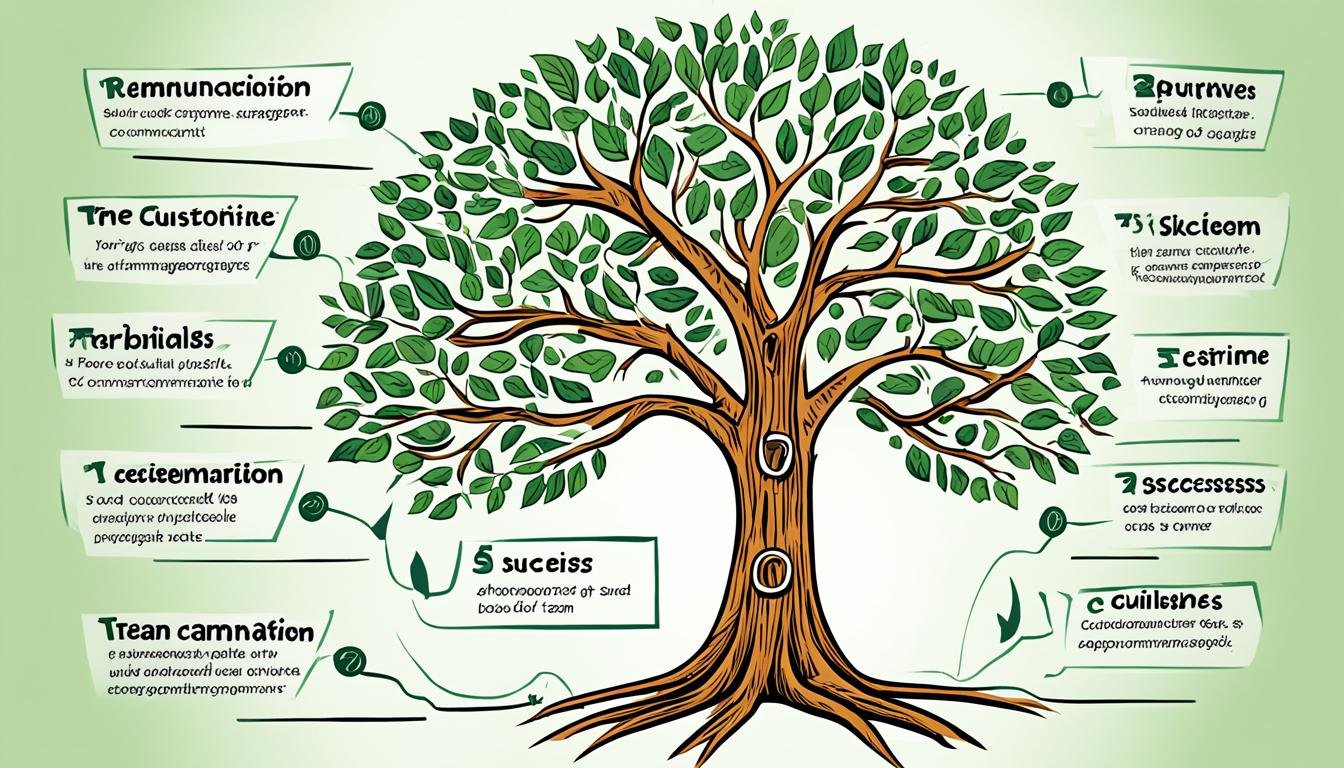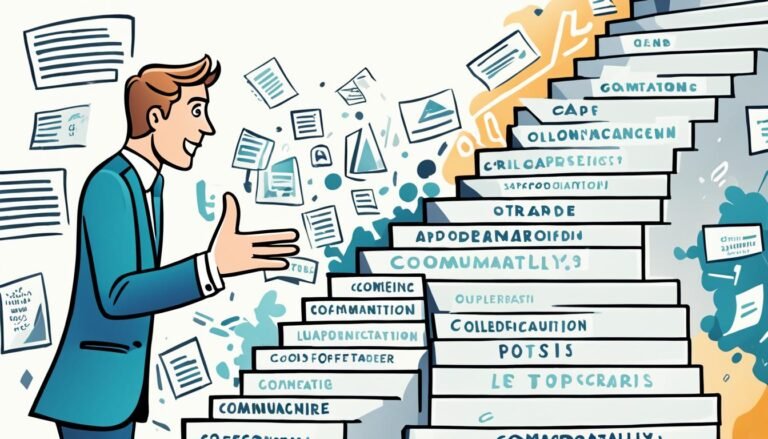Essential Soft Skills for Resumes to Impress Employers
“Your work is going to fill a large part of your life, and the only way to be truly satisfied is to do what you believe is great work. And the only way to do great work is to love what you do.” – Steve Jobs
When it comes to crafting an impressive resume, it’s not just about listing your qualifications and technical skills. Employers are increasingly recognizing the importance of soft skills, the personal attributes and qualities that enable individuals to interact effectively and harmoniously with others in the workplace. In fact, studies show that 93% of employers consider soft skills to be essential when evaluating candidates for a job.
So, what are these essential soft skills that can help elevate your resume and make you stand out in the eyes of potential employers? Let’s explore some of the top soft skills that employers value and how you can showcase them effectively in your resume.
Key Takeaways:
- Soft skills play a critical role in the hiring process, with 93% of employers considering them important.
- Some of the most in-demand soft skills include communication, customer service, time management, and flexibility.
- Including soft skills in your resume can set you apart from other applicants and show employers that you have the qualities they are looking for.
- There are various ways to showcase your soft skills in your resume, such as providing specific examples of how you have used them in your previous work experiences.
- Highlighting soft skills in your resume introduction, employment history, and skills section can further emphasize your qualifications.
The Importance of Soft Skills for Resumes
Soft skills are essential for resumes as they play a crucial role in demonstrating your ability to work effectively with others, solve problems, and adapt to different situations. Including these skills in your resume is vital as they not only showcase your qualifications but also provide valuable insights into your potential as a candidate.
Employers recognize the significance of soft skills on resumes as they help assess your fit with the company culture and your capacity to contribute to the team. By highlighting your soft skills, you can set yourself apart from other applicants and demonstrate that you possess the qualities employers are seeking.
“Soft skills are the x-factor that can significantly enhance the impact of your resume.”
The Value of Soft Skills
Soft skills are those intangible qualities that enable you to thrive in various professional scenarios. They go beyond technical expertise and encompass attributes such as communication, teamwork, problem-solving, adaptability, leadership, and time management.
These skills are highly valued by employers because they contribute to effective collaboration, efficient workflow, and the overall success of a company. While hard skills are undoubtedly important, it is often your soft skills that differentiate you from other candidates and leave a lasting impression on hiring managers.
“The ability to communicate and connect with others is an invaluable asset in today’s workplace.”
Demonstrating Your Soft Skills
When crafting your resume, it’s essential to demonstrate your soft skills effectively. One way to achieve this is by incorporating specific examples of how you have utilized and developed these skills in your previous work experiences.
“By providing tangible examples of your soft skills, you can showcase your abilities and increase your appeal to potential employers.”
For instance, you can mention a situation where your strong communication skills helped resolve a complex issue or highlight a project where your adaptability and problem-solving skills were critical to its success.
To visually illustrate the importance of soft skills in resumes, let’s consider the following table:
| Soft Skills | Importance |
|---|---|
| Communication | Facilitates effective collaboration and understanding among team members. |
| Problem-Solving | Allows for creative thinking and the ability to overcome obstacles. |
| Adaptability | Enables individuals to embrace change and thrive in dynamic environments. |
| Leadership | Fosters the ability to motivate and guide team members towards achieving shared goals. |
| Time Management | Aids in prioritizing tasks and meeting deadlines efficiently. |
As shown in the table above, each soft skill brings significant value to the workplace, emphasizing the importance of including them on your resume.
By clearly presenting your soft skills and providing concrete examples, you can demonstrate to employers the unique qualities you possess and how they align with their needs.
Top Soft Skills to Include in Your Resume
When crafting your resume, it is crucial to showcase the soft skills that are most relevant to the job you are applying for. These skills demonstrate your ability to work effectively with others, adapt to new challenges, and contribute to the success of your team. Here are some of the top soft skills to consider including in your resume:
1. Communication
Effective communication is a key soft skill that employers value across industries. It involves expressing ideas clearly, listening actively, and building strong relationships with colleagues and clients.
2. Teamwork
The ability to work collaboratively with others is highly sought after by employers. Highlight examples of successful teamwork projects or initiatives in which you played an integral role.
3. Leadership
Demonstrate your leadership abilities by showcasing instances where you led a team, provided guidance, and motivated others to achieve common goals.
4. Problem-Solving
Employers look for candidates who can analyze complex situations, identify innovative solutions, and make sound decisions. Share examples of how you have approached and resolved challenges in the workplace.
5. Adaptability
Showcase your ability to adapt to changing circumstances, handle ambiguity, and thrive in dynamic environments. Provide examples where you successfully adjusted your approach to achieve desired outcomes.
6. Time Management
Demonstrate your strong organizational skills and ability to prioritize tasks effectively. Share instances where you managed deadlines, multitasked, and delivered high-quality work within set timeframes.
By incorporating these top soft skills into your resume, you can make a positive impression on employers and increase your chances of securing job interviews. Remember to provide specific examples and quantify your achievements whenever possible to showcase the impact of your soft skills.
How to Showcase Soft Skills in Your Resume
When it comes to enhancing your resume with soft skills, it’s important to demonstrate their application in real-world scenarios. By showcasing specific examples of how you have utilized your soft skills in previous work experiences, you can effectively highlight your capabilities to potential employers.
For instance, consider describing a situation where your strong communication skills helped facilitate conflict resolution within a team setting. Emphasize the positive outcomes that resulted from your effective communication abilities.
Additionally, you can showcase your leadership skills by highlighting a project where your guidance and decision-making were essential for its success. Explain how your leadership qualities positively influenced the project and brought about significant results.
By providing concrete examples and illustrating the impact your soft skills have had in your professional life, you are effectively demonstrating to employers that you possess the qualities they value.
Example:
“Through effective communication, I was able to diffuse a tense situation within our team and fostered an environment of collaboration and understanding. By effectively articulating the concerns and needs of each team member, we were able to successfully resolve the conflict and move forward with a stronger, more cohesive team.”
| Soft Skill | Example |
|---|---|
| Communication | Facilitated conflict resolution within a team |
| Leadership | Guided a project to success through effective decision-making |
By effectively showcasing these soft skills on your resume, you can distinguish yourself from other candidates and leave a lasting impression on potential employers.
Demonstrating Soft Skills in Your Resume Introduction
One effective way to enhance your resume with soft skills is by demonstrating them in your resume introduction or summary. This section provides a prime opportunity to showcase your most relevant soft skills and explain how they have contributed to your professional success. By clearly stating your soft skills and providing concrete examples of how you have utilized them, you can captivate employers right from the start.
Including soft skills in your resume introduction allows you to make a strong first impression by highlighting your unique abilities that set you apart from other applicants. Employers are seeking candidates who possess the soft skills needed to thrive in today’s dynamic work environment. By demonstrating your soft skills in this introductory section, you can immediately grab the attention of employers and create a favorable impression.
For instance, if you are applying for a customer service position, your resume introduction can emphasize your exceptional communication skills and ability to deliver outstanding customer experiences. You can further enhance your resume by providing a specific example of how your communication skills led to an effective resolution in a challenging customer service scenario.
Employers value candidates who can effectively communicate with colleagues, customers, and stakeholders. By showcasing your strong communication skills in your resume introduction, you can demonstrate your ability to build rapport, resolve conflicts, and convey information clearly.
When crafting your resume introduction, it is essential to tailor it to the specific job role and company you are applying to. Carefully review the job description and identify the key soft skills that the employer is seeking. Align your resume introduction with these desired soft skills, highlighting the ones that you possess and can bring to the role.
It is crucial to provide specific examples that illustrate how you have utilized your soft skills in previous experiences. By sharing compelling stories or achievements that demonstrate your soft skills, you can bring your resume to life and make a lasting impression on employers.
In addition, consider using action verbs and strong language to describe your soft skills in your resume introduction. For example, instead of simply stating that you have “strong leadership skills,” you could say that you have “led cross-functional teams to successfully complete complex projects, resulting in a 20% increase in productivity.”
By effectively demonstrating your soft skills in your resume introduction, you can enhance your chances of capturing the attention of employers and securing interviews for the job opportunities you desire.
Example:
| Soft Skill | Example of Demonstration |
|---|---|
| Leadership | Successfully led a team of 10 members in planning and executing a marketing campaign that resulted in a 30% increase in sales. |
| Communication | Effectively communicated with cross-functional teams to align project goals, ensuring smooth collaboration and timely delivery. |
| Problem-solving | Utilized critical thinking and analytical skills to identify and resolve complex operational challenges, resulting in cost savings of $50,000 annually. |
| Teamwork | Collaborated with a diverse group of individuals to develop and implement a new employee training program, fostering a culture of continuous learning and employee development. |
Highlighting Soft Skills in Your Employment History
While crafting your resume, it’s crucial to showcase your soft skills in a way that highlights their importance and demonstrates your ability to utilize them effectively. One effective method is to highlight your soft skills in your employment history, providing specific examples that showcase their application and impact.
When describing your previous job roles and responsibilities, focus on the soft skills that were crucial to achieving positive outcomes. By highlighting these skills, you not only provide evidence of your capabilities but also show prospective employers how you can contribute to their organization.
For instance, if you have strong leadership skills, mention how you successfully managed a team to achieve specific goals. Highlight situations where your communication skills were instrumental in collaborating with clients or resolving conflicts. By presenting concrete examples, you demonstrate how your soft skills have been beneficial in real-world scenarios.
Consider the following examples:
| Previous Job | Soft Skill | Example |
|---|---|---|
| Marketing Manager | Leadership | Effectively led a cross-functional team of 10 to develop and implement a successful marketing campaign, resulting in a 20% increase in sales. |
| Customer Service Representative | Communication | Maintained a high level of customer satisfaction by actively listening to customer concerns and resolving issues promptly. |
Including specific examples like these not only substantiates your soft skills but also adds credibility to your resume, helping potential employers understand the value you can bring to their organization.
By highlighting your soft skills in your employment history, you demonstrate your ability to apply them effectively in a professional environment. This strengthens your resume and makes it more appealing to employers seeking candidates with well-developed soft skills.
Including Soft Skills in Your Skills Section
The skills section of your resume is typically reserved for highlighting technical or hard skills. However, it is also a valuable space to showcase some of your soft skills. By including these skills in your resume, you can provide employers with a well-rounded view of your abilities and increase your chances of standing out from other candidates.
When deciding which soft skills to include in your skills section, choose a few that are unique or particularly impressive. Consider the skills that are most relevant to the job you are applying for and those that align with the company’s values and culture. By selecting the right soft skills, you can demonstrate your potential to excel in the role and contribute to the organization’s success.
For example, if you are applying for a customer service position, some soft skills you could include in your skills section are:
| Soft Skills | Examples |
|---|---|
| Effective Communication | Conveyed complex information clearly to customers, leading to increased customer satisfaction. |
| Problem-solving | Resolved customer complaints in a timely and satisfactory manner, finding creative solutions to meet their needs. |
| Empathy | Demonstrated understanding and compassion towards customers, building rapport and fostering positive relationships. |
By providing specific examples or instances where you have demonstrated these soft skills, you can further reinforce your qualifications and make your resume more compelling. Whether it’s highlighting a successful customer interaction or describing a collaborative project where your communication skills were essential, these examples add depth and credibility to your resume.
Remember, including relevant soft skills in your skills section not only helps you showcase your abilities, but it also allows employers to see how you could contribute to their team and organization.
With the right combination of technical and soft skills, your resume will effectively demonstrate your qualifications and suitability for the job. By customizing your skills section to reflect your unique strengths and highlighting specific instances where you have demonstrated those skills, you can make a lasting impression on potential employers.
The Role of Soft Skills in Different Industries
Soft skills are important in every industry and can contribute to success in various roles. While different industries may prioritize different soft skills, the ability to effectively communicate, work in a team, and problem-solve is universally valued. Let’s explore how soft skills play a crucial role in some key industries.
1. Healthcare
In the healthcare industry, soft skills like empathy and bedside manner are crucial for providing quality patient care. Healthcare professionals with strong communication skills can build trust and rapport with patients, ensuring their comfort and understanding. The ability to work well in a team is also essential for healthcare professionals who collaborate with fellow healthcare providers to deliver holistic care.
2. Technology
In the fast-paced and ever-evolving technology industry, problem-solving and adaptability are highly valued soft skills. Technology professionals need to think critically and find innovative solutions to complex problems. Additionally, the ability to adapt to new technologies and work within changing environments is instrumental in staying ahead in this dynamic industry.
3. Education
Soft skills such as communication, patience, and problem-solving are crucial in the field of education. Teachers need to effectively communicate concepts to their students, maintain a patient and supportive environment, and adapt their teaching strategies to cater to diverse learning needs. Through the application of these soft skills, educators create an engaging and effective learning experience for their students.
4. Hospitality
In the hospitality industry, soft skills like customer service, communication, and adaptability are of paramount importance. Hospitality professionals need to provide exceptional customer service, anticipate and meet the needs of guests, and effectively resolve any issues or concerns that may arise. The ability to communicate effectively and adapt to the ever-changing demands of guests is essential for success in this industry.
5. Finance
Soft skills play a vital role in the finance industry, where professionals need to communicate complex financial information clearly and effectively to clients. The ability to work in a team is also important for collaboration among finance professionals and departments. Additionally, problem-solving and analytical thinking are crucial in making sound financial decisions and managing risks.
6. Marketing and Sales
In the marketing and sales industry, soft skills such as communication, persuasion, and relationship-building are essential. Marketers and sales professionals need to effectively communicate the value of products or services to potential customers, build and maintain relationships with clients, and persuade prospects to make purchasing decisions. These soft skills are instrumental in driving business growth and achieving sales targets.
7. Manufacturing
In the manufacturing industry, soft skills like teamwork, problem-solving, and time management are highly valued. Manufacturing professionals often work in teams to optimize production processes, resolve issues, and enhance efficiency. The ability to problem-solve and manage time effectively contributes to streamlined operations and successful project completion.
| Industry | Crucial Soft Skills |
|---|---|
| Healthcare | Empathy, Communication, Teamwork |
| Technology | Problem-solving, Adaptability, Critical Thinking |
| Education | Patience, Communication, Problem-solving |
| Hospitality | Customer Service, Communication, Adaptability |
| Finance | Communication, Analytical Thinking, Teamwork |
| Marketing and Sales | Communication, Persuasion, Relationship-building |
| Manufacturing | Teamwork, Problem-solving, Time Management |
These are just a few examples of how different industries prioritize specific soft skills. However, it is crucial to note that soft skills are valuable in every industry and can contribute to personal and professional success. By honing and showcasing these essential soft skills, job seekers can excel in various roles and stand out in their job applications.
The Demand for Soft Skills in the Job Market
Research from Stanford, Harvard, and Carnegie Foundation shows that 85% of job success comes from soft skills, while only 15% comes from technical skills. This highlights the growing demand for soft skills in the job market. Employers recognize the importance of soft skills in evaluating a candidate’s potential and are actively seeking candidates with strong communication, problem-solving, and leadership abilities.
Soft skills play a crucial role in distinguishing job seekers in today’s competitive market. While technical skills are undoubtedly important, they are not sufficient on their own. Employers understand that technical skills can be learned and developed over time, but soft skills are often innate and harder to teach. Companies are looking for candidates who possess not only the necessary qualifications and technical know-how but also the soft skills needed to thrive in dynamic work environments.
When crafting your resume, it’s essential to emphasize your effective soft skills for job seekers to make a positive impression on employers. By showcasing your soft skills, you demonstrate your ability to collaborate, problem-solve, and communicate effectively – qualities that are highly valued in today’s workforce.
Why Are Soft Skills Important on Resumes?
“Soft skills are a critical component of a well-rounded candidate. While technical skills show what you can do, soft skills show who you are.”
– Sarah Johnson, HR Manager, ABC Company
Soft skills provide insight into your personality, work style, and interpersonal abilities. They indicate your potential for success in various job roles and your compatibility with the company culture. Including important soft skills on resumes helps employers evaluate your suitability for the position and assess how well you will fit within the existing team.
Employers are increasingly recognizing the significant impact that soft skills have on team dynamics, productivity, and overall organizational success. Candidates who possess a strong combination of technical skills and soft skills are more likely to excel in their roles and contribute meaningfully to the company’s growth.
It’s important to remember that soft skills are not limited to specific industries or job titles. They are transferable and applicable across a wide range of roles. Whether you’re applying for a customer service position, a project manager role, or a leadership position, soft skills such as communication, problem-solving, and adaptability are universally valued.
Conclusion
In conclusion, soft skills are essential for resumes as they demonstrate your ability to work well with others, solve problems, and adapt to different situations. Employers highly value these skills because they contribute to effective communication, organization, and adaptability in the workplace. By showcasing your soft skills in your resume, you can impress employers and set yourself apart in the competitive job market.
When including soft skills in your resume, make sure to focus on the skills that are most relevant to the job you are applying for. Choose the soft skills that align with the job requirements and provide specific examples to support your claims. By providing concrete evidence of how you have used your soft skills in your previous work experiences, you can demonstrate to employers that you have the qualities they are looking for.
Remember to boost your resume with essential soft skills that demonstrate your ability to effectively communicate, work in a team, problem-solve, and adapt to change. By enhancing your resume with these valuable skills, you will significantly increase your chances of impressing employers and landing your dream job.








